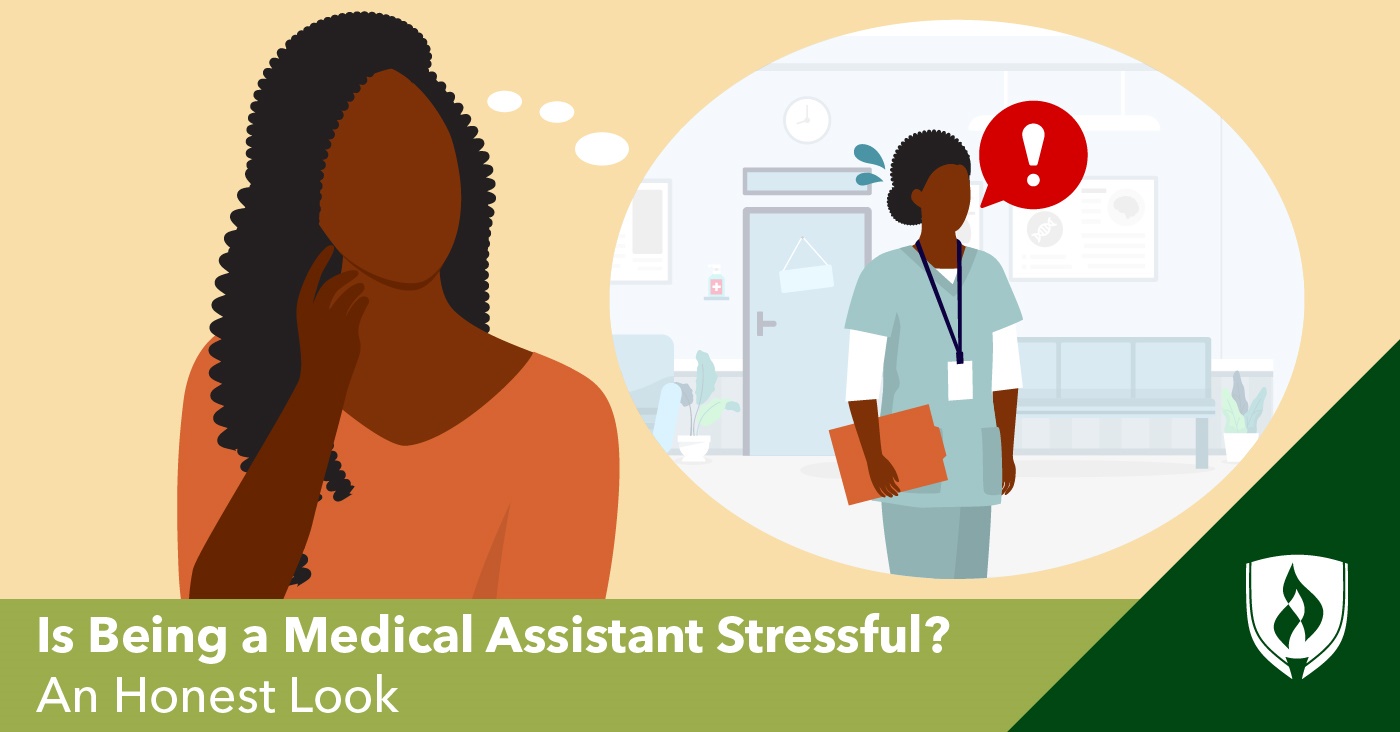
Making a visit to the clinic for a routine check-up involves quite a bit of work behind the scenes. While you as a patient might not be laser-focused on all the procedures, paperwork and other administrative tasks the staff completes before your conversation with the doctor, the work remains critical.
These important tasks are what make up much of a medical assistant’s responsibilities, work that is crucial for keeping a clinic or healthcare facility running smoothly. If you’re interested in making the move from patient to employee by pursuing a healthcare career, this role may have your interest.
With this interest comes curiosity about the day-to-day work. Is medical assisting stressful? What makes being a medical assistant challenging? What does it really look like to work in this role?
We can help you by answering some of those key curiosities. Read on for a closer view of the role of a medical assistant and insight into the potential stressors associated with this job.
What is being a medical assistant really like?
The day-to-day routine varies for medical assistants, as it depends on the type of clinic they work in or the size of the hospital they work at. Being a medical assistant involves public-facing work, interacting with patients from the moment they set their appointments to checking in for a visit.
Medical assistants work on their feet and behind desks, interact with doctors, nurses, other medical staff and patients, and use personal communication and technical skills required to update patient records electronically. Versatility, attention to detail, strong interpersonal skills and the ability to think on the fly are all important for this job.
Is being a medical assistant stressful?
While everyone defines stress differently—one person’s stress can be another’s excitement—it’s helpful to understand what a job involves to determine if your personality and skills will be a good fit. After all, difficult coworkers or unpredictable schedules can be a source of stress in any job.
Keeping that in mind, we’ve outlined some key parts of medical assisting that may present challenges for some.
1. You’re always on the move
Clinics, hospitals and urgent care facilities tend to run at a brisk pace. For people who like to think and work on their feet, medical assistant jobs are a great choice.
“When I worked in the urgent care setting, there was never any time to stress out over what the chief complaint was for the patient since all of the patients were considered a ‘walk-in’ with an emergent situation,” says Lauren Ramirez, department chair for the School of Health Sciences at Rasmussen University.
Ramirez found the pace in this setting exciting.
“Truly, you never knew what was going to walk in from the outside,” she says.
While not every medical assistant will work in an urgent care setting, you should still expect your days to remain busy as a medical assistant. If there’s not a steady stream of in-person patient needs to tend to, there’s likely to be an administrative project to take on or help out with.
2. Listening and attentiveness are critical
Along with a quick pace, medical assistants are constantly using their active listening skills. Setting appointments, entering data into patient records and asking patients to describe symptoms all require an attentive ear.
“Each patient that walks through the door has their own story to tell, and the only way to know that story is to ask,” Ramirez says. “Every time a patient came in, their issues became my issues.”
Ramirez believes that medical assistants begin the process of helping patients with their concerns the moment they arrive for their visit.
“Understanding their difficulties, concerns, pain and questions was within my scope,” Ramirez says. “Seeing patients at their low points and seeing their uncertainty was difficult, but I knew I needed to examine the situation and discuss with the patient in detail to see how I could help.”
3. You’ll need to be an effective teammate
Good communication isn’t just important for patient care but also for understanding the flow of the healthcare system as a whole.
“My colleagues taught me more than I could have imagined and truly were my cheerleaders,” Ramirez recalls.
Being able to work with other parts of the organization is also a big part of a medical assistant’s job.
“Medical assistants offer highly versatile skill sets alongside other medical specialists and allied health professionals,” Ramirez says.
Knowing that quality patient care is a goal the whole healthcare team shares is crucial. If one part of the system needs help, having a good sense of cooperation and collaboration helps decrease the stress on any one person.
4. Empathy is key
No matter what else is going on, a successful medical assistant learns to focus on the patient and what they need in the moment.
Ramirez worked in both urgent care and primary care clinics as a medical assistant, so she saw patients who had unexpected health issues pop up as well as patients who were coming in to be seen for known problems. She recalls that at times, it was more stressful with patients whose concerns were already available in their charts than the walk-in cases at urgent care.
“Sometimes, seeing what we were going to have to assist with was more stressful because without seeing the actual patient, we couldn’t assess the real problem, and had to think about, sometimes for hours, before the patient arrived to be seen,” Ramirez says.
In either case, Ramirez advises that being able to see things from a patient’s perspective makes delivering their care less difficult in the moment.
“Put yourself in your patient’s shoes,” advises Ramirez. “We never know what someone else is going through, and, sometimes, all it takes is for you to sit down, relax and listen.”
5. It’s a role full of personal interactions
Working with people—whether they’re patients, physicians or other healthcare professionals—always comes with some potential for stress. There are as many personalities out there as there are people, and you’ll inevitably encounter someone you’d prefer not to interact with.
While that’s not a unique potential source of stress, the circumstances of these interactions can be. Going to the doctor can be a big source of worry or even agitation for patients—they’re wondering about insurance coverage and what the visit will cost them, frustrated by tough-to-diagnose ailments or generally feeling bad enough to seek out medical help. That context can make even a naturally chipper person seem a little grumpy.
When in doubt, medical assistants will need to lean on their empathetic side and avoid taking the occasional unpleasant interaction personally.
Is being a medical assistant stressful? It’s your call to make
Will a job as a medical assistant stress you out? That’s for you to decide. As with any job, there are aspects that can be troublesome and challenging. Considering your own personality and strengths when thinking about the type of work a medical assistant does is a good way to make that determination.
Think this role is a good match for you? Learn more details on how to get started with our article “How to Become a Medical Assistant: The Steps You Can’t Ignore.”
Related Articles:




